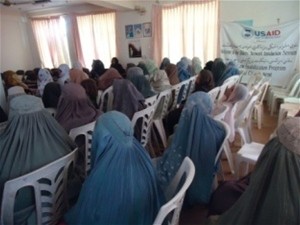
Sixty-five women – primarily from the villages of Arghandab – discussed women’s roles in resolving village conflicts in Kandahar.
USAID/RLS-I
Arghandab District’s community leaders meet for the first time to strengthen dispute resolution.
11 OCTOBER 2010 | KANDAHAR, AFGHANISTAN
It was the first time she had ever been asked to leave her village for a meeting in nearby Kandahar City. Her decision to participate wasn’t easy – just a few days earlier, six Afghans had been killed there, one of whom was simply selling bread to the government. Her district, Arghandab, had recently seen increased insurgent activity that made travel a life-threatening choice.
Despite that, she ultimately decided to attend the first meeting of women elders organized by USAID’s Rule of Law Stabilization Program – Informal Component (RLS-I). She participated along with more than 60 other women who were all aware that by simply attending, and thus associating with a highly publicized U.S. government program, they could face dire consequences.
“I have found jirga (a decision making assembly of male elders) to be sincere decision-makers concerning women,” said one woman who attended the meeting. “After my husband’s death, there was nobody to support me. However, a jirga made the decision to help me financially, and provided me a piece of land so that I could have a home with my children.”
The week before, more than 120 male elders braved the same unstable security situation, to meet for the first time to discuss strengthening community-based dispute resolution (CBDR) in their villages. At both men’s and women’s meetings, elders recounted similar jirga decisions concerning family matters, land, and water that kept the peace among tribes and communities. Elders said that unlike other regions, jirga influence has diminished in Kandahar. Participants agreed that CBDR needs to be revitalized and that future RLS-I activities could assist with resolution of conflicts.
State justice officials also attended the elder’s meeting, joining in on the discussions. “Coordinating with us and referring criminal cases to the district court would be highly appreciated,” the Arghandab district judge told elders.
RLS-I will continue support for Arghandab district elders with regular meetings for men and women, including seminars on land, property, and family law. Future activities will include elders from other Kandahar districts such as Dand, Daman, and Panjwayi.







Comment
Make a general inquiry or suggest an improvement.